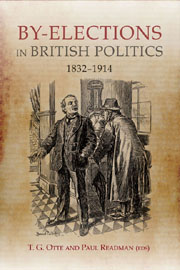Book contents
- Frontmatter
- Contents
- List of Figures and Tables
- List of Contributors
- Preface and Acknowledgements
- List of Abbreviations
- Introduction
- 1 ‘Plumping Contests’: The Impact of By-elections on English Voting Behaviour, 1790–1868
- 2 Government Appointment By-elections: 1832–86
- 3 ‘We should have had 1,000’: The By-elections of the 1874 Parliament
- 4 ‘The Glamour of Independence’: By-elections and Radicalism during the Liberal Meridian, 1869–83
- 5 ‘The Swing of the Pendulum at Home’: By-elections and Foreign Policy, 1865–1914
- 6 By-elections and the Modernisation of Party Organisation, 1867–1914
- 7 ‘A Terrific Outburst of Political Meteorology’: By-elections and the Unionist Electoral Ascendancy in Late-Victorian England
- 8 Land Reform and By-elections, 1885–1914: Do By-elections Matter?
- 9 Edwardian By-elections
- 10 Lloyd George, Limehouse and the Realignment of British Politics: The Bermondsey By-election of 1909
- 11 By-elections and the Peculiarities of Scottish Politics, 1832–1900
- Index of By-election Contests
- General Index
8 - Land Reform and By-elections, 1885–1914: Do By-elections Matter?
Published online by Cambridge University Press: 05 May 2013
- Frontmatter
- Contents
- List of Figures and Tables
- List of Contributors
- Preface and Acknowledgements
- List of Abbreviations
- Introduction
- 1 ‘Plumping Contests’: The Impact of By-elections on English Voting Behaviour, 1790–1868
- 2 Government Appointment By-elections: 1832–86
- 3 ‘We should have had 1,000’: The By-elections of the 1874 Parliament
- 4 ‘The Glamour of Independence’: By-elections and Radicalism during the Liberal Meridian, 1869–83
- 5 ‘The Swing of the Pendulum at Home’: By-elections and Foreign Policy, 1865–1914
- 6 By-elections and the Modernisation of Party Organisation, 1867–1914
- 7 ‘A Terrific Outburst of Political Meteorology’: By-elections and the Unionist Electoral Ascendancy in Late-Victorian England
- 8 Land Reform and By-elections, 1885–1914: Do By-elections Matter?
- 9 Edwardian By-elections
- 10 Lloyd George, Limehouse and the Realignment of British Politics: The Bermondsey By-election of 1909
- 11 By-elections and the Peculiarities of Scottish Politics, 1832–1900
- Index of By-election Contests
- General Index
Summary
By-elections were crucial to nineteenth-century and early twentieth-century politics because they offered the most reliable evidence of movements of public opinion between general elections. This meant they received a great deal of attention from politicians seeking to interpret trends in the popularity of political parties and predict the outcome of general elections. Even lofty political figures like Gladstone were not immune from these attempts to unravel the meanings of by-elections. Twentieth- and twenty-first-century historians have replicated this interest and there have been some important debates about how trends in by-election voting should be interpreted, especially whether the period 1911–14 provides any evidence for the Liberal party's imminent demise, at the hands of Labour or the Conservatives, on the eve of the First World War. However, this interest in the psephology of by-elections begs a crucial question: if by-elections were the most reliable means of finding out what the voters thought between general elections, in what ways, if at all, did this influence policy-making in the major political parties? This is a much less studied aspect of by-elections. In the late nineteenth and early twentieth centuries the only substantial works that attempt to assess by-elections in this way are both tightly-focused studies concentrating on foreign policy: Martin Ceadel's essay on the 1933 East Fulham contest and rearmament; and T.G. Otte's examination of by-elections and Salisbury's foreign policy in the year 1898.
- Type
- Chapter
- Information
- By-Elections in British Politics, 1832-1914 , pp. 201 - 226Publisher: Boydell & BrewerPrint publication year: 2013



